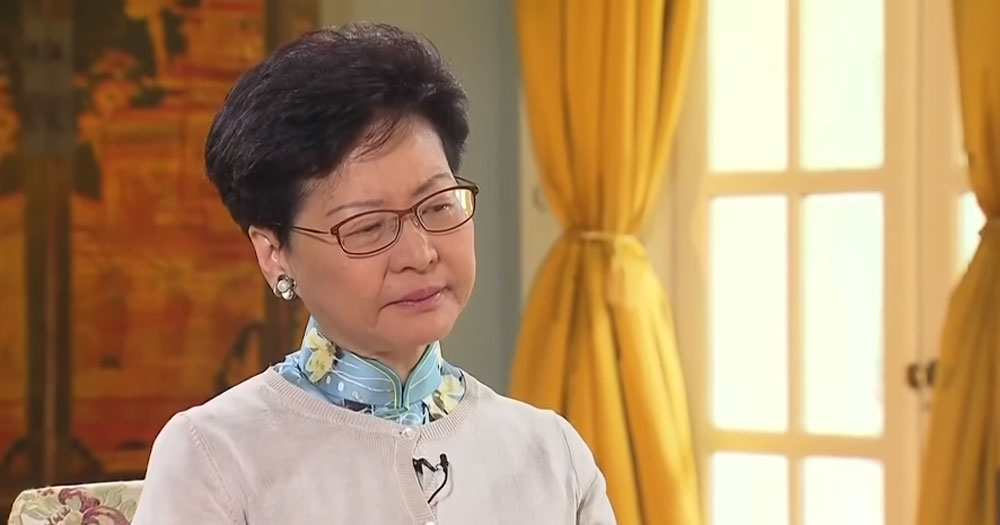Embattled Hong Kong Chief Executive Carrie Lam said she would quit if she had a choice, according to Reuters in a special report on Sept. 2.
Her remarks were captured in an audio recording made in the last week of August to a group of business people.
The 24-minute recording of her remarks was reviewed by Reuters.
In it, she effectively admitted she has caused "unforgivable havoc" by igniting the political crisis engulfing the city.
The meeting was one of a number of "closed-door sessions" that Lam said she has been doing "with people from all walks of life" in Hong Kong.
"Very limited" room
Lam apparently told the group at a closed-door meeting that she now has "very limited" room to resolve the crisis.
It was effectively beyond her control as the unrest had already reached a national security and sovereignty issue for China amid rising tensions with the United States,
"If I have a choice," she said in English, "the first thing is to quit, having made a deep apology."
Sounded pained
Reuters reported that Lam's dramatic and at times anguished remarks is a window into the Chinese leadership thinking as it navigates the unrest in Hong Kong.
Reuters reported previously that China had rejected any proposal by Lam to consider the protesters' demands -- a clear sign Beijing is in control of Hong Kong's leadership.
But what has been somewhat reassuring though, was that Lam suggested that Beijing had not yet reached a turning point.
The Chinese leadership has not imposed any deadline for ending the crisis ahead of National Day celebrations scheduled for Oct. 1.
And she said China had "absolutely no plan" to deploy People's Liberation Army troops on Hong Kong streets.
Impact of protests on personal life
The tone of Lam's comments in the recording also revealed the personal impact of the three-month crisis.
At times, she can be heard choking up.
This was at odds with her more steely public image.
"For a chief executive to have caused this huge havoc to Hong Kong is unforgivable," she said.
Lam also spoke about the impact the crisis has had on her daily life.
"Nowadays it is extremely difficult for me to go out," she said.
"I have not been on the streets, not in shopping malls, can't go to a hair salon. I can't do anything because my whereabouts will be spread around social media."
If she were to appear in public, she said, "you could expect a big crowd of black t-shirts and black-masked young people waiting for me".
Serving "two masters"
Lam noted that she had few options once an issue had been elevated "to a national level", a reference to the leadership in Beijing.
In such a situation, she added, "the room, the political room for the chief executive who, unfortunately, has to serve two masters by constitution, that is the central people's government and the people of Hong Kong, that political room for manoeuvring is very, very, very limited."
China's reputation also at stake
Lam told the meeting that the leadership in Beijing was aware of the potential damage to China's reputation that would arise from sending troops into Hong Kong to quell the protests.
"They know that the price would be too huge to pay," she said.
"They care about the country's international profile."
"It has taken China a long time to build up to that sort of international profile and to have some say, not only being a big economy but a responsible big economy, so to forsake all those positive developments is clearly not on their agenda."
But she said China was "willing to play long" to ride out the unrest.
This could even come at the expense of city as it bears the economic pain, including a drop in tourism and losing out on capital inflows such as initial public offerings.
Lam also spoke about the importance of the rule of law in Hong Kong and restoring stability to the city of more than 7 million, as well as the need to improve efforts to get the government's message out.
She also spoke about her profound frustration with not being able "to reduce the pressure on my frontline police officers", or to provide a political solution to "pacify the large number of peaceful protesters who are so angry with the government, with me in particular".
But she said this was not the time for "self-pity".
Her inability "to offer a political situation in order to relieve the tension", she said, was the source of her "biggest sadness".
Applause can be heard at the end of the recording.
Private meetings
Lam's office said the leader had attended meetings and both were effectively private.
"We are therefore not in a position to comment on what the Chief Executive has said at those events," the spokesman said.
China's Hong Kong and Macau Affairs Office, a high-level agency under China's cabinet, the State Council, did not respond to questions by Reuters.
China's State Council Information Office did not immediately respond to questions from Reuters too.
Leader chosen to "unite society"
After enjoying relatively high popularity in the initial part of her tenure, Lam is now the least popular of any of the four leaders who have run Hong Kong since its handover from British to Chinese rule in 1997, according to veteran pollster Robert Chung, who runs the Public Opinion Research Institute.
Lam was chosen as city leader in March 2017, vowing to "unite society" and heal divisions in Hong Kong.
If you like what you read, follow us on Facebook, Instagram, Twitter and Telegram to get the latest updates.
